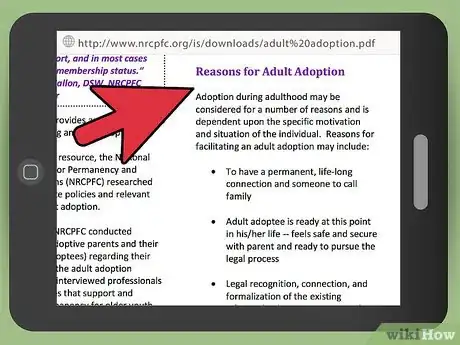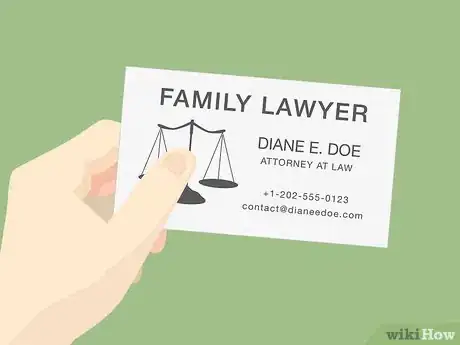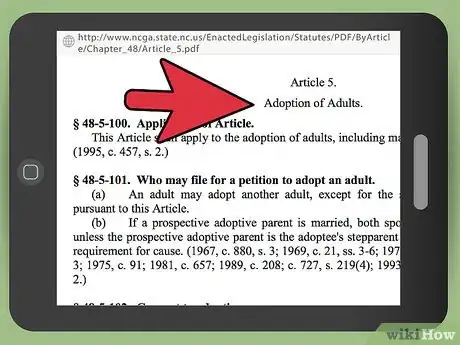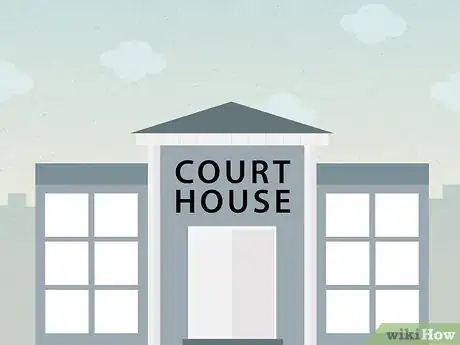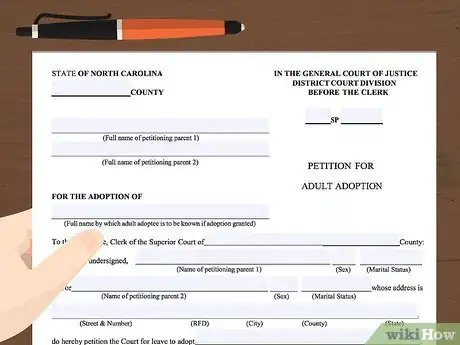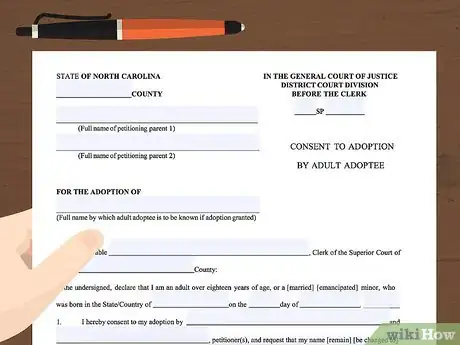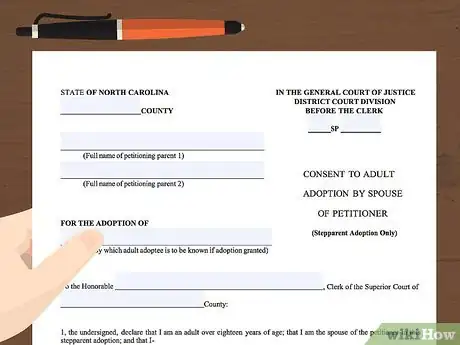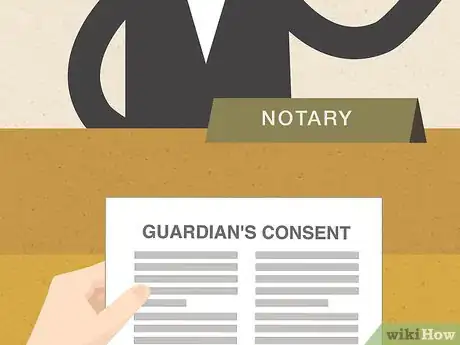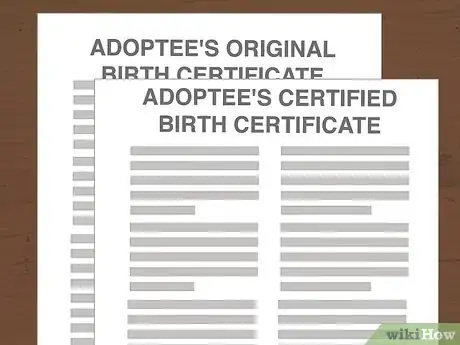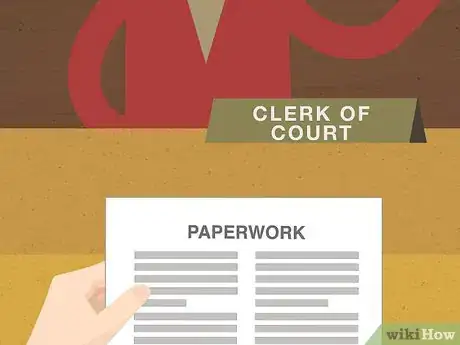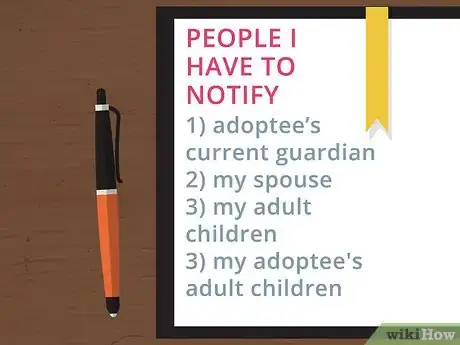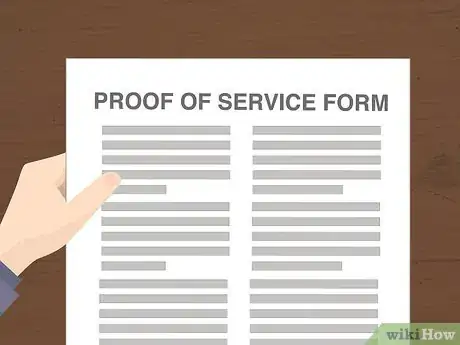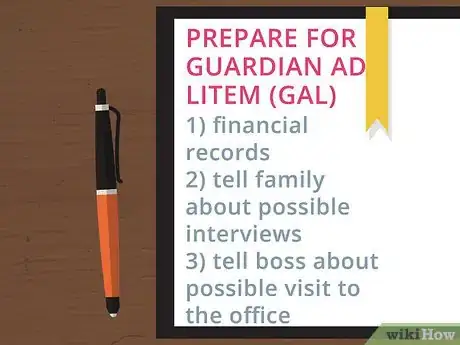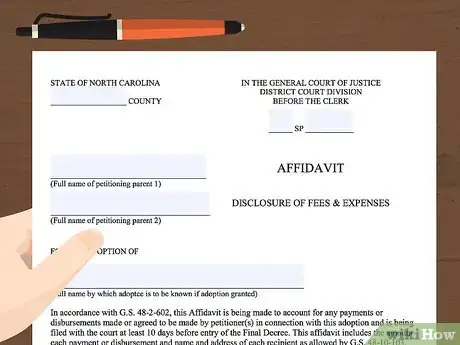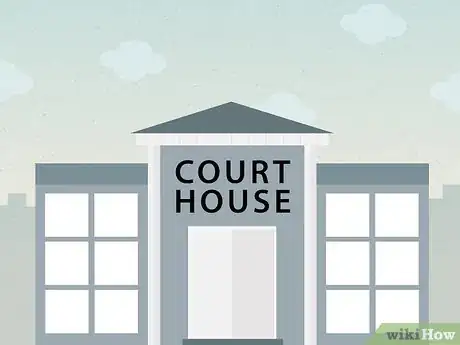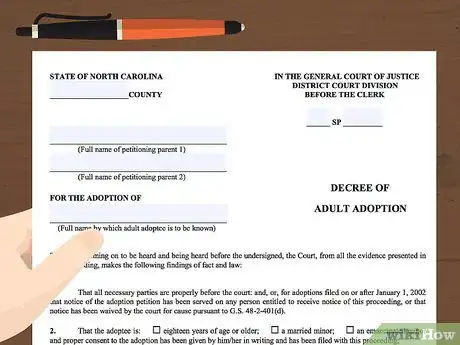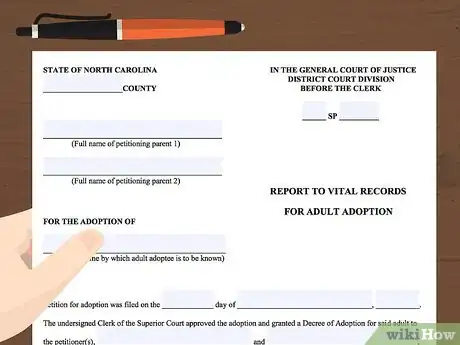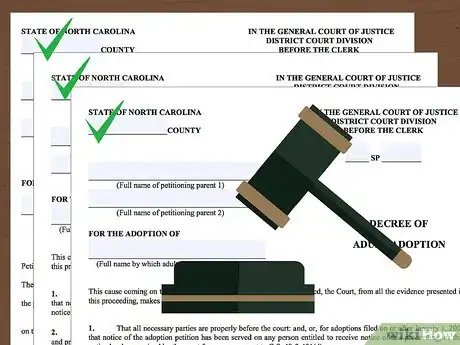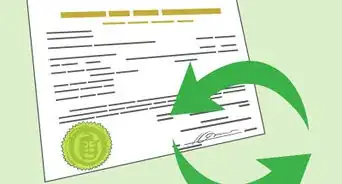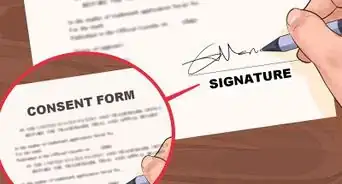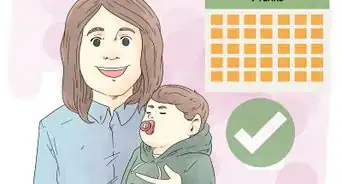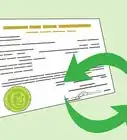This article was co-authored by Clinton M. Sandvick, JD, PhD. Clinton M. Sandvick worked as a civil litigator in California for over 7 years. He received his JD from the University of Wisconsin-Madison in 1998 and his PhD in American History from the University of Oregon in 2013.
wikiHow marks an article as reader-approved once it receives enough positive feedback. In this case, 96% of readers who voted found the article helpful, earning it our reader-approved status.
This article has been viewed 25,541 times.
Adopting an adult can provide a person with the support, love, and help they need. These adoptions can also confer legal benefits onto the adult adoptee (i.e., the person being adopted). For example, an adopted adult will inherit from you when you pass away. In addition, you will be able to make medical decisions should the adult adoptee ever need your help. If you want to adopt an adult in North Carolina, you need to prepare court forms, file your paperwork with the court, and finalize the adoption.
Steps
Preparing Adoption Documents
-
1Decide whether an adult adoption is right for you. Adopting an adult can be a good idea for any number of reasons. While your situation will undoubtedly be unique, you should consider an adult adoption if you:
- Were the foster parent of the adult while he or she was growing up. The child might not have wanted to be adopted earlier in life so he or she could receive foster care benefits (e.g., medical and financial).
- Want some legal recognition and formalization of a longstanding parent-child relationship.
- Want to provide inheritance rights to the adult.
- Want the adult to have a parent who can act as a medical contact and/or make medical decisions.
- Feel as though the adult needs (or wants) support throughout life (e.g., birthdays, anniversaries, births).
-
2Hire a lawyer. Adopting an adult in North Carolina requires that you file a petition with your local court and attend a formal hearing. While the process is relatively straightforward, the use of a lawyer can help you understand the legal ramifications of going through with the adoption (e.g., inheritance rights, diminished rights of your spouse). In addition, a lawyer will help you fill out your forms accurately and completely. Failure to do this may result in your adoption being delayed.
- If you do not want to hire a lawyer for the entire adoption process, consider consulting one to get an idea of the process and requirements. A lot of lawyers will offer free consultations where you may be able to get the information you need.
- If you do not know where to Find a Good Family Law Attorney, contact the North Carolina State Bar Lawyer Referral Service. After answering a few questions about your legal issue, you will be put in contact with various family law lawyers in your area.[1]
Advertisement -
3Check North Carolina adult adoption laws. North Carolina, by statute, allows for the adoption of adults. The only time an adult cannot be adopted is if that adult is your spouse. When you petition to adopt an adult, that adult, as well as other interested parties, must consent to the adoption.[2] Finally, either you or the adoptee (i.e., the person you are adopting) must have lived in North Carolina for six consecutive months preceding the adoption petition.
-
4Contact your local court for required forms. If you meet the requirements necessary to adopt an adult, visit your local courthouse and obtain an adult adoption packet. Most courts will put together a set of forms, which you can use to petition the court, get consent, and finalize the adoption. Even if there is not an entire packet available, court employees should be able to point you in the right direction.
- While some states will conduct adoption proceedings in special courts, North Carolina conducts adult adoptions in the General Court of Justice, District Court Division.
-
5Draft an adoption petition. Your adoption petition should be filled out on Form DSS-5163. The petition is the court document that starts the legal proceedings and informs the court of your intentions. The petition will always start with a caption, which identifies the county you are filing in and the petitioner(s) name(s). You are the petitioner, along with your spouse if applicable, because you are the one asking for the adoption. In addition to the caption, your petition must also contain the following information:
- The full name of the adoptee
- Your name and address
- A promise that you or the adoptee have lived in North Carolina for six consecutive months immediately preceding the petition
- Where and when the adoptee was born
- Whether you are related to the adoptee
- The names, ages, and addresses of any adult children you have
- The names, ages, and addresses of any adult children, parents, and spouses the adoptee has
-
6Obtain consent from the adult adoptee. In North Carolina, the adult adoptee must consent to the adoption for it to be valid. The consent must be in writing and be signed in front of a notary. It must contain a statement indicating that the adoptee understands that he or she will take on a parent child relationship with you. It must also contain a statement indicating that the adoptee understand that he or she may be losing, or gaining, certain inheritance rights from certain individuals.[3]
- A consent Form (Form DSS-5164) is available for you to give to the adoptee.[4]
-
7Get your spouse's consent. If you are the adoptee's stepparent, and you are still married to your spouse, that spouse must also consent to the adoption. The consent must be in writing and signed in front of a notary. The consent must contain a statement indicating that the spouse understands that he or she might have a diminished inheritance right after the adoption is finalized. The spouse must also indicate that the adoption is in your best interest, as well as that of the adult adoptee.[5]
- A spousal consent form (Form DSS-5165) is available for you to give to your spouse.[6]
-
8Acquire a guardian's consent. If the adult being adopted has been determined to be incompetent (e.g., mentally or physically disabled), the adoptee's guardian must consent to the adoption instead of the adoptee. The consent must be in writing and signed in front of a notary. The guardian must indicate that he or she understands the adoption will affect the rights of the adoptee, that the adoption is in the best interest of the adoptee, and that the adoption will not terminate the guardian's rights, duties, or obligations.[7]
- There is no consent form for the guardian. If you need the guardian to consent, inform them of the requirements and let them return a customized consent form to you.
-
9Gather attachments. Your county may require you to attach the adoptee's certified birth certificate to the rest of your court paperwork. If the adoptee is from another country, the original birth certificate must be attached along with a translation. In addition, some courts may require you to provide a written statement telling the court why you want to adopt the adult. If you are not required to do this in writing, you will have to do this verbally during your court hearing.
Filing Paperwork with the Court
-
1Submit your paperwork to the clerk of court. When all of your paperwork has been filled out, take everything to the clerk of court. This court employee will file your paperwork and start the adoption process. When you file, you will be required to give the clerk your original copies of everything. Therefore, it is important you make multiple copies of everything for your records. When you successfully file your paperwork, it will be stamped as "filed" and your copies will be returned to you.
- The courthouse you file with will be the courthouse in the county where you reside. Make sure you file with the correct court or your adoption may be delayed.
-
2Pay the required filing fee. At the same time you file your paperwork, you will also have to pay a filing fee. The filing fee will vary from county to county but generally falls somewhere between $100 and $400. If you cannot afford to pay the filing fee, you may ask the court for a fee waiver. The court will grant your waiver if you can prove you do not have the financial ability to make the required payment.
-
3Notify all required persons under the law. Within 30 days of filing your adoption petition, you must serve notice of your filing on certain persons. In an adult adoption, you must notify:[8]
- Any person who is required to give consent
- Your spouse
- Your adult children
- The adoptee's adult children
-
4File proof of service forms. When you serve people, hire someone over the age of 18 who is unrelated to the case. He or she will mail or hand deliver copies of your court filings to each individual. Once service has been completed, the server will fill out a proof of service form promising that service was completed legally.
- These proof of service forms must be filed with the court.
Finalizing the Adoption
-
1Help the court conduct an investigation. If the adult adoptee is incompetent, the court will appoint a guardian ad litem (GAL), which is a court employee responsible for taking the adoptee's best interests into consideration.[9] The GAL will conduct an investigation into the adoption and report his or her findings to the court. During the investigation, the GAL may visit you, inspect your home, inspect your financial information, and may conduct interviews with friends and family.
- Help the GAL in any way you can to ensure a positive report is made. While not dispositive, a negative report can affect your ability to finalize the adoption.
-
2File an affidavit disclosing fees and expenses. At least 10 days before the final adoption decree is signed, you must provide the court with details about payments you made in connection with the adoption. You can do this by filling out Form DSS-5191, signing it, and filing it with the court before your hearing.
- Form DSS-5191 will ask you to include the amount of each payment, the recipient of each payment, and a description of each payment.
-
3Attend the adoption hearing. On the day of your adoption hearing, arrive to the courthouse early. Give yourself enough time to find parking, get through security, and settle into the courtroom. The adoptee and any interested parties will also attend the hearing. When your case is called, go to the front of the courtroom and wait for the proceedings to start. The judge will need to know the following information in order to grant your adoption petition:
- All interested parties are at the hearing and have an opportunity to speak
- The adoptee is over the age of 18 and the proper consent has been given
- All other required consents have been obtained
- At least 30 days have elapsed since you filed your petition for adoption
- The adoption is being entered into freely without duress or undue influence
- One or both current parents understand that parental rights will be terminated
-
4Ask the court to sign the adoption decree. After the hearing concludes, the judge will decide whether to grant the adult adoption. If the judge grants the adoption, he or she will need to sign an adoption decree, which makes the judge's ruling final.
- Before the hearing starts, obtain a copy of Form DSS-5166, which is an adoption decree. Fill in the blanks and take the original copy to your hearing.
- When the hearing concludes, hand the decree to the judge. He or she will sign the bottom of it. The clerk of court will make copies for your records.
-
5Amend the adoptee's birth certificate. Soon after your hearing, when the judge signs the adoption decree, he or she will also sign a vital records request. This request asks the state to make a new, and updated, version of the adoptee's birth certificate. Fill out Form DSS-5167 and submit it with the adoption decree.
- Form DSS-5167 asks you to provide the court with the adoptee's name, as you would like it to be on the new birth certificate. In addition, you will be able to provide your personal information, which will also be placed on the new birth certificate.
-
6Deal with problems. If your adoption petition is unopposed and you get the consent of every necessary party, the adoption process will go smoothly. If this is the case, the court will grant the adoption so long as it is found to be in the best interest of the adult adoptee and you meet all the requirements of an adoption (e.g., filling out the petition and completing all other paperwork).
- However, in some circumstances, someone might oppose the adoption. This will be rare in adult adoptions because the only parties that need to consent are the adult adoptee and your spouse (if applicable).
- If the adult adoptee opposes the adoption, you will have no chance of getting it granted.
- If your spouse opposes the adoption, your hearing will be contentious. You will have to convince the judge that, despite your spouse's opposition, the adoption should be granted. The judge will only grant the adoption if he or she can find cause to waive the consent requirement.[10] In most cases, this occurs when spouses are separated or estranged.
References
- ↑ http://www.ncbar.org/members/lawyer-referral-service/
- ↑ http://www.ncga.state.nc.us/EnactedLegislation/Statutes/PDF/ByArticle/Chapter_48/Article_5.pdf
- ↑ http://www.ncga.state.nc.us/EnactedLegislation/Statutes/PDF/ByArticle/Chapter_48/Article_5.pdf
- ↑ https://www2.ncdhhs.gov/info/olm/forms/dss/dss-5164-ia.pdf
- ↑ http://www.ncga.state.nc.us/EnactedLegislation/Statutes/PDF/ByArticle/Chapter_48/Article_5.pdf
- ↑ https://www2.ncdhhs.gov/info/olm/forms/dss/dss-5165-ia.pdf
- ↑ http://www.ncga.state.nc.us/EnactedLegislation/Statutes/PDF/ByArticle/Chapter_48/Article_5.pdf
- ↑ http://www.ncga.state.nc.us/enactedlegislation/statutes/pdf/bysection/chapter_48/gs_48-2-401.pdf
- ↑ http://www.ncga.state.nc.us/EnactedLegislation/Statutes/PDF/ByArticle/Chapter_48/Article_5.pdf
